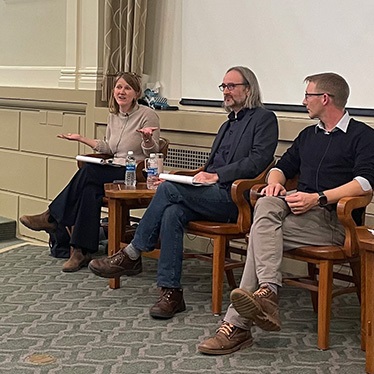For Humphrey Alumnus Nicolas Pichay, All the World’s a Stage
November 24, 2021

When Nicolas Pichay arrived in Syracuse as part of the 2017-18 Humphrey Fellowship cohort, “Hamilton: An American Musical,” was a hot ticket on Broadway. It took Pichay six months to get tickets to the Tony Award and Pulitzer Prize winning show by Lin-Manuel Miranda.
The popular musical tells the story—in a very modern way—of American founders including Alexander Hamilton, the main author of 85 anonymous essays known as the Federalist Papers, which urged ratification of the proposed U.S. Constitution and a strong central government.
Pichay, a lawyer who heads the Senate Legislative Research Service of the Philippines, had been following 2016 presidential candidate Rodrigo Duterte's campaign promise to shift the country to a federalist system. That fueled Pichay’s interest in studying U.S. federalism as a Humphrey fellow at the Maxwell School. “I wanted to understand the relationship between the U.S. and Philippines,” he said. “I kept looking at stuff that had an overlap with America: pictures, text, the forms of government, the culture.”
His Humphrey year research informs “Lapulapu, Ang Datu ng Mactan,” a musical Pichay wrote about a 16th-century Filipino hero. The show, presented Oct. 24 at Manila Metropolitan Theater, was part of the Philippines' commemoration of the 1521 Battle of Mactan and the arrival of Christianity in the country. The indigenous leader Lapulapu, a symbol of Filipino resistance, is remembered for defeating the forces of Ferdinand Magellan, who was killed in the battle.
The show played to an empty theater and was broadcast live and streamed on the theater’s Facebook page. A review in Philippines’ BusinessMirror called it a “subversive and reflexive” story that “shows us how to decolonize our past.” The show, the review continued “triumphs over impositions from intellectuals whose perspectives remain beyond our control and etched in a monolithic history many are not brave enough to question.”
The story, Pichay said, highlights the victory of a local leader over Magellan. It’s also a commentary urging people to discover new worlds and to listen to their higher calling. Like “Hamilton,” “Lapulapu” raises questions about how history shapes a country’s understanding of issues like colonialism, national memory and cultural identity.
Although Pichay stuck to the version of history most Filipinos know, he added people to the script and rewrote the lyrics of a popular folk song. The latter, he said, “is the perfect musical metaphor to explain Lapulapu's reaction to Western domination."
“Lapulapu” also illustrates Pichay’s ability to pursue two seemingly divergent paths: an analytical law career and his creative and artistic side. "We can incorporate both into our thinking," he said. "It’s a better way of understanding life."
Related News
School News

Apr 2, 2025
School News

Mar 26, 2025
School News

Mar 24, 2025
School News

Mar 18, 2025